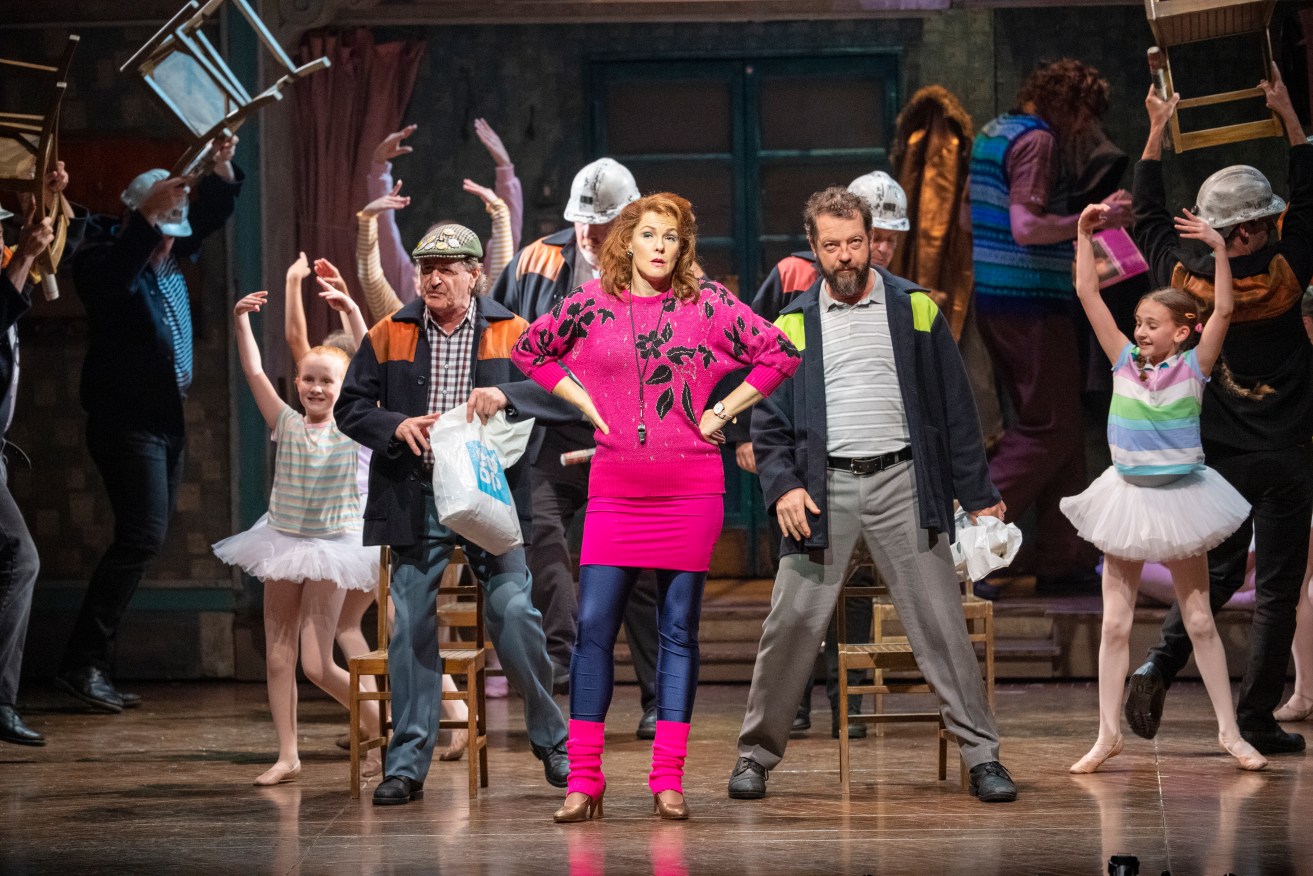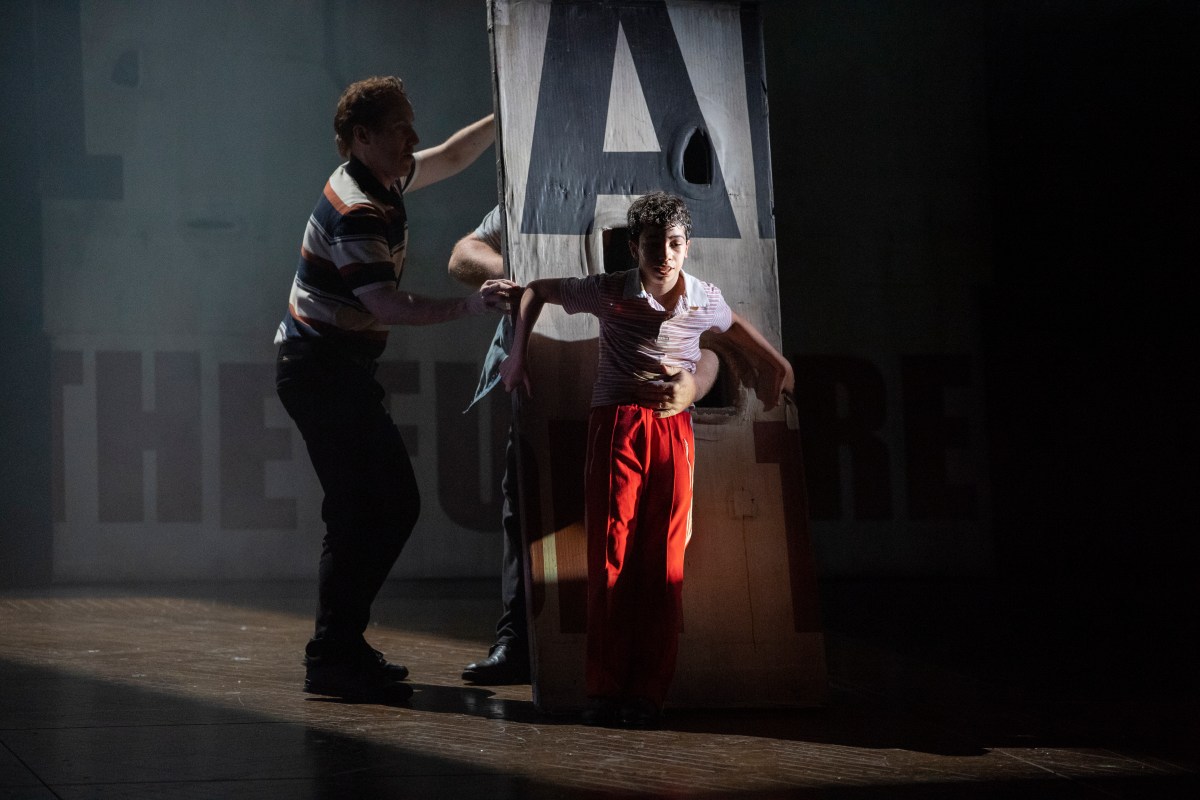Theatre review: Billy Elliot The Musical
The musical version of the loved film poses some challenges to an audience as it winds its way to an inspirational ending via a thicket of broad northern accents, coal-mining politics, death, loss and poverty.


Lisa Sontag as Mrs Wilkinson flanked by Robert Grubb as George (left) and Justin Smith as Billy's dad. Photo: James Morgan
The tale of the miner’s son who finds hope – and escape – through the unlikely medium of ballet made a powerful impact on film in 2000.
Director Stephen Daldry played a role in adapting it for the stage only a few years later, with Elton John providing the music. As far as I can tell, it has played to universal acclaim ever since.
Billed as a tenth-anniversary revival – given the show was first mounted in Australia in 2009 – this production is a slick machine, anchored by excellent performances by the key leads.
And it has to be to overcome some of the issues with the source material, as well as, surprisingly, a frankly unmemorable score.
Billy is the 12-year-old son of a coal miner in a northern English town. Projected newsreel footage at the beginning of the show gives some context: the proud history of coal mining, the nationalisation of the industry and the importance of the jobs to working-class towns.
Enter the mostly unseen villain of the piece – Tory PM Margaret Thatcher who sought to close pits and break of the power of the mining union.
Her action sparked the epic miners’ strike of 1984-85, setting the political and economic backdrop for Billy’s story.
Billy lives with his dad, much older brother and grandmother, who suffers from dementia. His mother is dead, but appears – ghost-like – at various times through the story.
On Saturdays, Billy is meant to go to boxing lessons but is quickly attracted by the following class – ballet, taught by the chain-smoking Mrs Wilkinson.
The key role of Billy is shared in this production by four young performers. At the matinee this reviewer attended, Billy was played by Omar Abiad – a fine dancer who played the character with a bit more ratbag energy than the moody Jamie Bell in the film.
Lisa Sontag’s Mrs Wilkinson is the pivotal role, both hard-bitten and tender – like the entire story. Stage and screen actor Justin Smith is convincing as the confused and angry dad, while Vivien Davies, as Grandma, provides the most poignant and effective number – remembering her abusive, alcoholic husband and the few moments of light in their relationship which, revealingly, centred on dancing.

Omar Abiad playing Billy Elliot. Photo: James Morgan
Setting aside the left-right political battle which seems more disconcerting as time goes on – the noble working class seeking to keep coal pits open, while the evil right-wing Government seeks to close them down – the Billy Elliot story has a few other hurdles to leap.
Even in the excellent film, the transformation of the key characters seems to happen very quickly. The angry and hurt Billy embraces dance in the end, but the pivot moments are hard to pinpoint; his Dad moves an even further distance – both in relation to the boy’s aspirations and his own political actions – without a great deal of extrapolation. Then there’s Billy’s friend Michael, played with enthusiasm and great timing in this performance by James Sonnemann, whose character’s probable complications and challenges are pretty much glossed over by the script (its treatment of homophobia is also unsettling at times).
These points aren’t always helped by the musical format, which tends to put a sunnier complexion on the essential grittiness of the story. However, in the second Act, the reasons why the film struck such a chord also become apparent on stage as Billy’s incipient aspirations – the seemingly impossible longshot of attending the royal ballet school – gathers momentum and, eventually, galvanises and transforms the entire town.
When Abiad’s Billy is asked by the posh, disembodied voice of the royal ballet school assessor about how he feels when he dances, the young performer takes flight – both with his acting and dancing.
And then, as the chorus of miners – head torches aglow – descend again to the pit after the long strike is broken, we feel the power and universality of Daldry’s vision: the desire for community, the nobility of work (and it’s desolate opposite), and the hope for a child to transcend the limitations placed upon them by social status and loss.
If you loved the film, the musical will be – in the end – a satisfying journey.
Billy Elliot The Musical is playing at the Festival Theatre until January 26.
Want to comment?
Send us an email, making it clear which story you’re commenting on and including your full name (required for publication) and phone number (only for verification purposes). Please put “Reader views” in the subject.
We’ll publish the best comments in a regular “Reader Views” post. Your comments can be brief, or we can accept up to 350 words, or thereabouts.
InDaily has changed the way we receive comments. Go here for an explanation.




